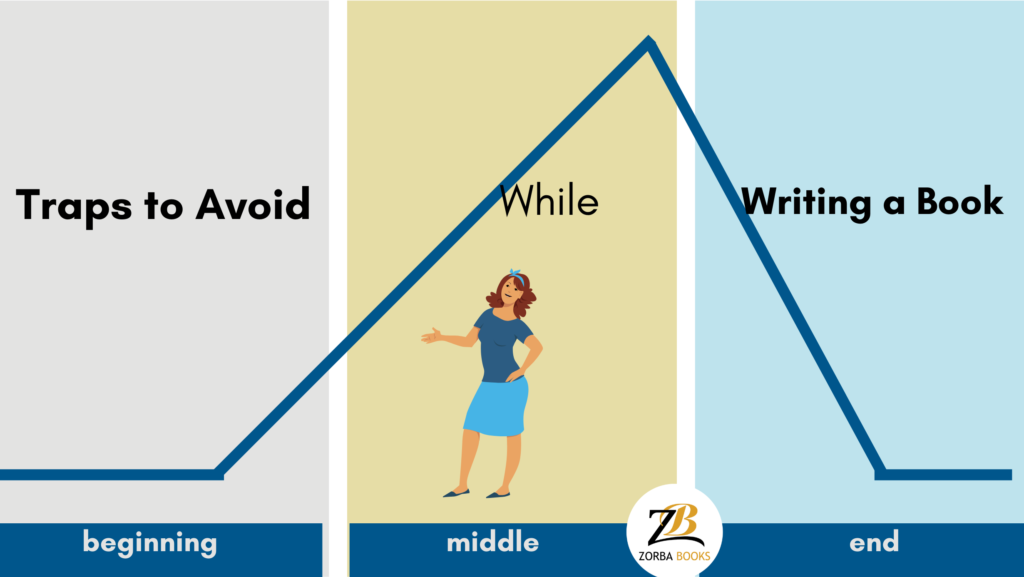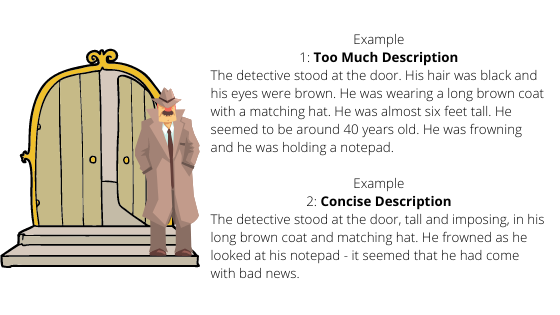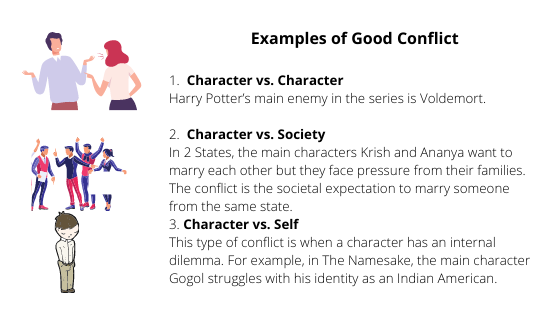
Key Tips For Writing a Book that Keeps the Reader Hooked
- Spend time developing a Plot Structure
- Make Characters in my Book Interesting
- How to Write Dialogues?
- How should I Begin Writing?
- How Much Description is Needed for my Book to be Interesting?
- Editing as You Write
- Getting Too Attached to your writing
- Wordy Sentences
- Is it a Good Idea to use Clichés while Writing a Book?
- What are the Ways to Make my Writing Interesting?
Could there be something wrong with your writing? There’s a lot of advice on how to write a book, but it’s equally important to know what not to write.
You might have the creativity but writing is difficult, even for the most experienced authors out there. If you feel like you’re hitting a wall with your writing, you might be falling into some common traps. Don’t worry, it happens to the best of us!
Once you can identify the traps, your writing a book process will become even more enjoyable and rewarding. Here are some mistakes to avoid, so you can tell your story in the best way possible.
1. Spend time developing a Plot Structure.
This may seem obvious, but it’s a common mistake that new writers make. You might have the best premise and characters, but the storytelling matters the most above all. Take time to plan out your plot – twists, reveals, endings – so that your writing choices feel real to the reader, rather than ones created to offer random shock value.

How to Avoid:
Keep the basic narrative arc in mind. This will help you pace the story – when to include a twist or when to build to the climax. It will ensure that while there’s never a dull moment in your story, and that every page has its purpose. If while writing a book you don’t like planning too much, at least be very clear while writing a book about your beginning, middle, and end.
However, it’s only natural that you might change your plans in the middle of writing. Maybe you get a genius idea that has to be included. That’s fine, you can always incorporate it while editing. It’s good to keep updating your plan with each draft!
2. Make Characters in my Book Interesting.
Making your characters perfect is a deceptive trap. It might seem like the best way to make them likeable, but your characters must be well-rounded. To make them realistic, they have to have flaws and desires. The flaws can be used for conflict and the desires give them a reason for their actions. By doing this, the characters become relatable and they feel like real people. Without character depth, the reader will not be invested in them or the story.
How to Avoid:
Write down a list of character traits, goals, and flaws in a separate list. They don’t have to be specifically mentioned in the story, but it will give you an idea of what your character is like. If their traits are clear to you, you will naturally incorporate them when creating a character for your novel.
Pro Tip:
When writing flaws, don’t let your main characters become unlikable. They can have flaws, but the reader should be rooting for them!
3. How to Write Dialogues?
Dialogue is one of the notoriously tricky parts of writing a book. When done right, it can move the plot forward and add a sense of realism to the characters. However, unnatural dialogue can easily ruin your story, so be careful!
These mistakes could be the reason why your dialogue sounds unrealistic:
- Full Sentences: No one speaks in complete sentences all the time. People forget what they’re saying, or they’re interrupted. Include a variety of sentence lengths to mimic normal conversation.
- Contractions: Most people use contractions, and without them, your dialogue will sound stilted. “You’re coming to the party?” sounds more natural than “You are coming to the party?”
- Long Monologues: How many people make speeches in ordinary conversations? Probably not many. Dialogue should feel like a back-and-forth, even if you want one character to talk more than the other. Keep it to a few sentences at a time. (Of course, you can add a few monologues in your novel but don’t forget to space them out!)

How to Avoid:
Try and think of how you would speak to a friend. Listen to the speech patterns of the people around you and include them in your dialogue. Maybe one person stutters a lot, while the other person has a habit of repeating certain words. These little speech tics will help your dialogue feel realistic. Also, try reading your dialogue aloud with someone to see if it sounds like how you would usually talk.
4. How should I Begin Writing?
First impressions are key! The beginning is arguably the most crucial part, as the reader decides if they want to continue your story. Utilize this space to establish themes, setting, or characters. The reader needs to get a sense of what your story is going to be about, so get to the point.
How to Avoid:
While writing a book put the reader in the middle of the action, or introduce a dramatic event. No one wants to read about your character going about their normal, peaceful life. Adding conflict to the beginning does not mean you have to introduce the story’s main villain or central issue. You could introduce tension between two characters or include a dramatic event.
Pro Tip:
When you’re writing your first draft, it’s okay if the beginning is shaky. Most professional authors trash their original beginning or heavily revise it after the draft is done. Some even write their beginning last so they know what to include! There are many writing apps too that can help you, check them out too.
5. How Much Description is Needed for my Book to be Interesting?
Descriptions can make or break your novel. Too much, and it can slow the momentum of your story. Too little and your novel loses its sense of life and realism. Your descriptions should help your readers visualize the setting. No matter how beautifully written it is, long and wordy descriptions are often just skipped.

How to Avoid:
Mix in your descriptions throughout the story instead of dumping it all in one part. Make sure it’s spaced out so that it feels naturally included in the story. Have your characters notice things in the middle of the action. Break up your description with dialogue or thoughts of the narrator.
Like dialogue, your description should serve some purpose. Describe details in your setting that are important to the plot or to help your readers visualize the scene. Having a paragraph on what the sun looked like that morning doesn’t tell us much, but describing the character’s home does. Learn what to keep writing a book and what to get rid of.
Pro Tip:
For your description to feel more vivid, include all the senses – sight, smell, sound touch, and taste. Having a mix of all senses will help your setting come to life. (Avoid using clichés here! Overused metaphors make descriptions boring)
6. Editing as You Write
Writing and editing are separate processes. Lots of new writers make the mistake of editing as they write, to make sure that their writing is perfect. It’s an easy trap to fall into because you want your first draft to be amazing! But nothing is more important than getting the words on the page. If you’re constantly doubting yourself, you’ll be more likely to give up halfway through your draft.
How to Avoid:
Just write what comes to your mind, no matter how bad or good it is. First drafts are famously bad for everyone, so don’t be too hard on yourself. You just need to get all your ideas and content onto the page. Once you’re done, feel free to edit as much as you like. If you really can’t wait till the draft is complete, at least edit only after you finish a chapter.
7. Getting Too Attached
The famous rule “Kill Your Darlings” stands. It refers to any storyline, character, or sentence that you might love, but have to get rid of for the sake of the overall story. You might love the way you wrote a certain paragraph, but it might not add any value to your story. New writers often get too attached to their writing, but keeping these elements in will ultimately harm you.
How to Avoid:
Check for redundancy. Ask friends, mentors, or advisers to see if the element is necessary to the story. They will be less biased than you, so listen to their advice. Also, look out for clarity. If that extra plot point makes your story confusing, it’s not worth keeping in. Ultimately, if there’s something in your story that doesn’t serve any purpose to anyone but you, it might be time to cut it.
Pro Tip:
Create a document with the characters, storylines, and sentences that you cut out. They might find their home in another story!
8. Wordy Sentences
Clear and concise writing is key. You might love winding sentences but the reader probably doesn’t. It’s confusing and you could be using this space to be adding something new. This doesn’t mean you can’t have longer sentences, but be mindful of the words you’re choosing.

How to Avoid This:
Cut the crutch words. “Just, kind of, sort of, very, definitely, actually, quite” aren’t always necessary. They can be used for emphasis or in dialogue but be careful not to overuse them. Similarly, look out for “there, it, that, this, feel, think”. While these words are necessary for some sentences, challenge yourself to write without them. You’ll add more variety to your sentences and avoid repetition.
Pro Tip:
Also cut down on the passive voice. Most literature relies on strong, active-voice sentences.
‘She shut the door’ vs ‘The door was shut by her’.
In the first example, the focus is on the subject doing the action. The second sentence uses more words to say the same thing, and the door is emphasized for no reason. Passive voice is one of those small details that can take away from your writing.
9. Is it a Good Idea to use Clichés while Writing a Book?
“Don’t be cliched” has become a cliché at this point. But, in this case, it’s good advice. If you’re passionate about your story, don’t rely on cliched metaphors or comparisons. Readers are used to them, and it’s always more interesting to bring your fresh take.
How to Avoid:
When you spot a cliché in the story, rework the sentence. Find a different way to word your comparison, and it will always sound better than an overused metaphor. Examples of clichés are “A diamond in the rough” or “red as a rose.”
Pro Tip:
Clichéd storylines are equally bad. You can adhere to the conventions of your genre, but try to be inventive. In a crime novel, the protagonist can be the detective, but don’t let the butler be the murderer. Make sure your plot twists will have your readers surprised!
10. What are the Ways to Make my Writing Interesting?
This is another trap that may seem obvious, but conflict is the driving force of your story. Even if it’s a happy romance novel, there needs to be some tension. Conflict adds drama and entertainment to the story. Otherwise, why would anyone want to read the story?

How to Avoid:
Think of what your characters desire, and try to write an obstacle that will get in the way of it. Another way to spice up your story is to add different types of conflict. One could be an external obstacle – a person or an event – that blocks the characters from getting what they want. Another kind is the internal conflict, where a character’s flaws lead to problems in the story. A mix of the two will create a well-rounded story.
11. Writing Randomly
It’s understandable to get frustrated while writing. You might want to take a long break away from your draft. While these breaks are important, practice makes perfect. Writing regularly will stop procrastination and writer’s block. As you keep writing, the words will flow out. But taking long gaps between writing will stop your progress.
How to Avoid:
Set a daily writing quota – a certain number of words you want to write in a day. Writing 500 words every day is more sustainable than writing 4000 words in one day. If you need to take a break from your draft, work on something else as long as you keep writing. For more on- a guide to writing a book for new writers.
This advice is important, it will give you the best chance of succeeding as a new writer. As you progress, you’ll find your style, learn to use your judgement, and these mistakes will fall into place.
Read, read and read to write better
Above all, you have to love what you’re writing! If you’re passionate about your story idea, it will translate onto the page. If you don’t love your story, your readers probably won’t. Passion is the most important part of writing so don’t give up on your draft.
Pingback: The Best Apps for Writing Your Book - ZorbaBooks
Pingback: Which Type of Editing is Good for my Book? - ZorbaBooks
Pingback: Researching for a Book ? 3 Powerful Strategies - ZorbaBooks
Pingback: FAQ's on Writing a Book - ZorbaBooks
Pingback: Six Secrets Of How to Write a Romantic Novel, Revealed - ZorbaBooks
Pingback: FAQ on Publishing a Book - ZorbaBooks
Pingback: Use These Feedback Strategies to Pen a Manuscript that Readers will Love - ZorbaBooks
Pingback: How to write short stories? - ZorbaBooks
Pingback: Delight the Reader, write Dialogues Using These 11 Tips - ZorbaBooks
Pingback: 4 Invaluable tips on writing a Children's Book - ZorbaBooks
Pingback: Write a Book in 3 Easy Steps - ZorbaBooks
Pingback: How to write your first e-book? - ZorbaBooks
Pingback: Enhance Your Creative Writing Skills - ZorbaBooks
Pingback: How to Write a Bestselling Book? - ZorbaBooks
Pingback: The Ultimate Guide to Publish your Book - ZorbaBooks
Pingback: Guide To Writing a Horror Story - ZorbaBooks
Pingback: Writing a Fantasy Story to Captivate the Reader - ZorbaBooks
Pingback: Unravelling the Tale: How to Write a Story in English and Hindi? - ZorbaBooks